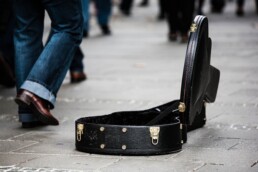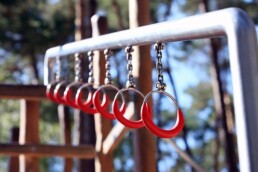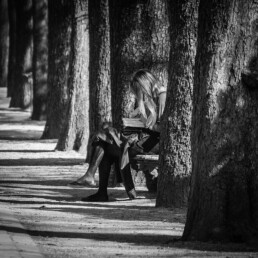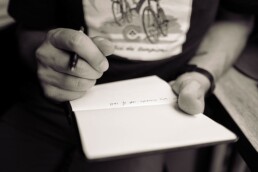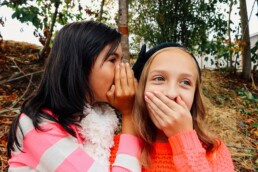Woody Way
(From the Songbook of Public Forgetting)
By Eddie Glenn
Hey, Woody Guthrie, I’m in your home-state
Woody, gotta tell ya, man, the roads are not great
They don’t like wastin’ their money on taxes
I busted my bladder, and broke both my axles
Woody, all your old neighbors vote red
Now, don’t get excited ’bout what I just said
It don’t mean the same as it did in your day
It just means they take in a lot more than they pay
Now, Woody, tell me, is that the Woody Way?
When I got to your hometown, my money was spent
So I found a piece of ground, and I set up my tent
In the mornin’ a fella came ’round in his truck
He said, “This land is MY land! You owe me twenty bucks”
Woody, you would not believe this is true
They’ve got a big festival named after you
They play all your songs, and they smoke lots of dope
They make bank sellin’ hippies home-made flavored soap
Is that the Woody Way? Some folks would say, “Nope”
Woody, I went walkin’ all through your hometown
There were thousands of guitars and banjos around
The Chamber of Commerce director shook my hand
Then he sold me an album of his favorite band
Hey Woody, I’m sure you’d be thrilled to have found
They took the billboard that said, “Woody’s a Commie” down
Okemah’s a lot different than when you were here
All the people here love you, one week a year
Now that’s the Woody Way, Woody, I fear
Why I Teach
By Randii Harrald
The reason that I educate and teach,
Goes beyond what people may think.
There is so much to be learned,
And for a good life, I want students to yearn.
As an educator, I feel it is my duty,
To help them live their lives fully.
To say, “You can do it!” and “Always be better!”
And “Don’t be afraid to speak!” because their voices matter.
To always encourage and motivate,
And spread goodness and love, over evil and hate.
To help them decipher what life is all about,
Dr. Seuss said, “Why fit in when you were born to stand out?”
In one of Erik Erikson’s Development Stages,
Identity vs. Role Confusion are the adolescent ages.
Figuring out who they are and what they want to do,
Is a hard realization for students to succumb to.
So I am a listening ear when the going gets tough,
Letting them know life isn’t always so rough.
Explaining to them, they are never alone,
To have faith in Him because God is hope.
Health and Wellness is what I truly love,
I am overjoyed to share it with everyone.
Seeing someone make a healthy behavior change,
And being a part of that process is a great thing.
This past semester, I taught a credit Yoga class,
Where all of my students had anxiety and stress.
I am happy to say that at the end of eight weeks,
They were less stressed and filled with more peace.
Since all students are different and learn at their own pace,
I keep Vygotsky’s Scaffolding Technique in place.
Taking the time to help them succeed,
Creates positive results and increases self-esteem.
College students are amusing and wonderful,
And teaching them, I couldn’t be more grateful.
In any manner that I can make a student smile,
I feel like I am living a life worthwhile.
The gym is an experience where students can unwind,
But also were they can learn, grow, and thrive.
This is an example of interaction and continuity,
Explained by Educational Theorist, John Dewey.
The main reason that I educate and teach,
Is for all the different types of students I reach.
Listening to their plans, hopes, and dreams,
I could not imagine a better purpose for me.
References:
John Dewey's Philosophy of Experience and Education. (n.d.) Retrieved from http://www.icels-educators-for-learning.ca/index.php?option=com_content&view=article&id=53&Itemid=68#ref
McLeod, S. (2013) Erik Erikson. Retrieved from http://www.simplypsychology.org/Erik-Erikson.html
McLeod, S. (2012). Zone of Proximal Development. Retrieved from http://www.simplypsychology.org/Zone-of-Proximal-Development.html
When We Were Kids
By Percy Totten
When we were kids,
We had too much energy
But all we wanted to do was sleep.
Only as we grew older,
We realized
That youth doesn’t last forever
And by the time we wanted
To run and jump and scream,
Our bodies were too weak.
And by the time we wanted
To laugh throughout the night,
It would hurt our chests
And we’d fall asleep.
But in my dreams,
We’d be young again.
We’d smoke in secret in your old den;
We’d run off into forests
To sing in beds
Of clovers,
Always wishing we were older.
What I Say When We Are Writing
By Linda Russo
In those words are windows of o’s
Through which the heart flows
Tender hearts, open those o’s
Don’t overthink, don’t worry, be sensitive
Uncurl those edges to touch
The edge of thought, its ruffle
Or fray or tears (as in rips) or tears (as in drops)
Touch and mingle
What stays for a while
And is a while
Feels whiley
In the space for embrace—
Through the os the portals:
Words, memories, emotions, slants
Out the window the same tree nods
In the late winds and the turbid sleeps
That wait for spring
In the silence of writing we agree
We see time in its branches
And beyond to the blue sky that is pale right now
So pale
The Socio-political Anarchistic Nihilistic Subterranean Homesick Blues . . . Rap
By Stephen Boyd Cates
Whatcha gon do when the grid goes down
And ya can’t text your baby when she’s way cross town?
Will ya cry, will ya cuss, will ya fuss and frown
Cuz ya got no batt-e- REEZ!?
Can’t find no batt-e-REEZ!
Well, the phones won’t work cuz there ain’t no juice
To charge ‘em up—it just ain’t no use,
So you get you a gun and go out and cruise
Just to steal some batt-e-REEZ.
Gotta find some batt-e-REEZ!
Go getcha gun now and practice up
Cuz the whole damn world is gonna erupt
And they’ll shoot you down and they’ll kill your pup
Just to get some batt-e-REEZ!
They want some batt-e-REEZ!
The smart I-phones won’t do no good
Everyone will be just as dumb as wood
Cuz they can’t answer questions like they used-ta could
When they had some batt-e-REEZ!
But there won’t be no batt-e-REEZ!
Well, your baby’ll go peddalin’ like a whore
Just a-sellin’ that thing from door to door
A-workin’ night and day just to try to score
Some stinkin’ batt-e-REEZ!
She gotta find some batt-e-REEZ!
When no electricity can be found
Not even for a mark a buck or a pound
You won’t e-mail your friends cross town
Cuz you got no batt-e-REEZ!
There ain’t no batt-e-REEZ!
Well, time’ll pass but it’ll do no good
You’ll be scroungin’ round a-lookin’ for wood
To cook your meat and heat the hood
Cuz there ain’t no batt-e-REEZ!
Ya won’t have no batt-e-REEZ!
I dreamed they fought a war in Jesus’ name
But when they texted everbody—well, no one came
It was the same ol’ thing—the same ol’ game
There wadn’t no batt-e-REEZ!
Can’t fight without batt-e-REEZ!
Well, I moved to Montana—I live off the land
I play my music in an acoustic band
No wah-wah peddle No amp’s demand
For E-lec-tri-ci-ty!
Or stinkin’ batt-e-REEZ!
Well, if the grid goes down it won’t bother me
Don’t need no E-lec-tri-ci-ty
Ain’t got no phone, no grid—I’m FREE!
Don’t need no batt-e-REEZ!
Don’t want no batt-e-REEZ!
Just keep your batt-e-REEZ!
Reflections on a Young Lady
By David Edwards
“Thus if you talk of a beautiful woman you mean only something flying fast which for a second uses the eyes, lips or cheeks . . . to glow through.”
Virginia Woolf, Jacob’s Room.
A sea of people move together,
Collide, fuse, split as one;
Eyes kept down and
Conversations kept amongst
Pockets of life embodied.
Treed walkways carry futures unknown:
Doctors, lawyers, leaders of great worlds and countries;
Thieves, liars, misogynists intermingled—futures waiting to be told.
I see her, I see
A mass of frizzy hair and wool sweater.
She sits apart
As the group moves around her.
She sits on the far side of a bench
Accompanied by large books on
Physics, Chemistry, and Biology.
Ah, she is the elusive feminine
Physical knowledge—the one
The 21st century has been seeking,
Breeding, building.
She speaks in formulas
And logarithms. She builds bridges
In her sleep and finds
Gravitons under rocks.
Higgs-Bosons flutter through her fingers.
It is stifling; her thick layers are
Impregnable.
She is impossibly thin,
Exceptionally frail.
Anorectic.
She stares empty-eyed as
The Tower bells vivisect time.
They pass by her but no one sits.
No, they don’t know her; the world walks by and no one knows her,
Sees her—
Do I?
Our Small Universe
By Sarah Stecher
I watch my memoir students free-write,
their heads bent over paper,
words spinning above them like
moons orbiting a planet,
penetrating force fields
of forgetfulness.
I watch them in their separate galaxies
moving light years away from me,
in awe of the space and time between us.
Their newfound intimacy with words,
small electrons that each harnesses
and pulls to the magnetic page,
cosmic storms of skating rinks and hayrides,
ice cream socials and wedding days.
I watch them, heads bent in a kind of prayer,
their scribbles a chant, a wizard’s spell,
conjuring remnants of the past
to life again, restoring muscle and flesh
to bones long dead, rendering with precise pen strokes
portraits of grandmothers, fathers, and infants
now grown, raising children of their own.
Each story—an indictment
and a benediction.
Moon and sun: regret and forgiveness.
I watch as calm wanders over our winter classroom and
warm afternoon sun streams in through colored glass,
casting prisms onto pages of ink.
I don’t want to disturb this hushed silence in
our small universe.
I often envy God His omniscience;
I believe today He envies me.
One Is All and All Is One
By David Nnaji
One is All and All is One
Everything we see and everyone we meet eddy in an endless flow of life.
The ant eats the grain, the bird eats the ant.
A beast bites the bird, and man beats the beast.
But as soil were we formed and as soil we return
To give for grain. “Nature is not fixed but fluid.”
For what's a measly meadow without the blades of grass?
The shadowed sky without the studded stars?
The broken beach without a grain of silver sand to slither through my hand?
Among a crowd we see ourselves then later everyone else.
A part! A piece! A slice of spirit pie!
A tone! A note! In a luxuriant melody!
Savor your fractions of the whole, and sing, therefore, your own song.
The gears shift and time ticks and ticks existence
In an antique cosmic clock—tirelessly it turns.
Replacing old cogs with new on such a massive scale,
We'd like to think the grand machines were created by some tinker.
But by putting the pieces together the pendulum swings
While the hands run. For in an endless universe
One is All and All is One.
On Tatjana, Veiled Head, Tight View, by Herb Ritz
By T. Allen Culpepper
In a portrait Ritts shot at Joshua Tree,
her head wrapped in black cloth,
a sheer veil both reveals her face
and curtains it off from us.
Her eyes, perhaps green or blue
(the photograph’s in black and white),
under gracefully arching brows,
cast an open gaze, frank despite its masking.
Her other features, a slender classic nose,
lips full but not unnaturally enhanced.
Though I know neither the woman nor her story,
her expression’s that of a confidant woman,
who knows what she wants and how
to get it without compromising herself,
who makes her own choices about
what and when to display, conceal.
The veil adds texture to her countenance
in the way of cracks in the paint
of a Renaissance portrait not yet restored.
Mostly the photo emphasizes
the left-and-down diagonal threads
making up the veil, suggesting
optimistic motion, but
over the woman’s left cheekbone,
to the viewers’ right when facing the image,
the crossthreads stand out more,
as if on a face in the aftermath of tears.
Her composure has arrived perhaps
by way of sorrow as well as joy.
New Words
By Rebekka Mallicoat
What a set of words we leave,
Our legacy to share.
Our children’s children looking back
Will see our shame laid bare.
Not for us, those Groovy Tunes,
The future verdict pending.
Why the wait for time’s last say?
It is already trending.
And when we meet, we will not plan
A time to shoot the Breeze;
Just like that, we are Friends now.
Alerts we must appease.
And when the day has been so rough
That you must share the ache,
It is your Blog that hears the pain,
An ear that cannot wake.
Or maybe you’ve just heard a joke;
Hilarity ensued.
You could call, but no, a Tweet?
Okay, but don’t be rude.
That could bear a heavy price,
A thoughtless, ill-timed joke.
The mob can tear a viral path
Through small-time city folk.
Or maybe they will Like your words
And Post them place to place;
There are whole groups of people-
This type of fame they chase.
And maybe they achieve that fame,
The Google search replies.
A Selfie for each perfect day;
No Instagram may die.
And if our children’s children
Make it here despite the odds,
They will find our silly lives
Displayed like those of gods.

